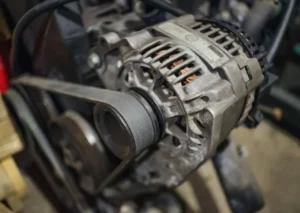The Silent Hero: Unraveling the Importance of Your Vehicle’s Timing Belt

Hidden beneath the hood of your car, the timing belt quietly plays a crucial role in the intricate dance of engine components. While often overlooked, understanding this essential part is vital for responsible car ownership. In this blog post, we’ll delve into the world of timing belts, exploring their significance, how they function, when to replace them, common issues to watch for, maintenance tips, and why professional auto service is essential to keep this silent hero in top shape.
The Significance of the Timing Belt
The timing belt is significant for several reasons:
- Engine Synchronization
It ensures precise coordination between the engine’s crankshaft and camshaft. - Valve Control
The timing belt controls the opening and closing of engine valves. - Engine Efficiency
Proper timing enhances combustion and fuel efficiency. - Prevent Catastrophic Engine Damage
A failing timing belt can lead to severe engine damage.
How the Timing Belt Functions
The timing belt operates by connecting the engine’s crankshaft and camshaft, ensuring they turn in sync. This synchronization is vital for proper valve timing, allowing air and fuel to enter and exit the combustion chambers at the right moment.
When to Replace the Timing Belt (100 words): Timing belt replacement intervals vary by vehicle and manufacturer, typically ranging from 60,000 to 100,000 miles. Consult your vehicle’s manual or a professional mechanic for specific recommendations.
Common Timing Belt Issues
Over time, timing belts can encounter problems, including:
- Belt Wear
The belt can degrade, develop cracks, or lose teeth. - Tensioner Failure
A failed tensioner can lead to belt slack and timing issues. - Water Pump Issues
A leaking water pump can damage the timing belt. - Misalignment
A misaligned belt can cause engine performance problems.
Maintenance Tips for the Timing Belt
To ensure your timing belt operates optimally, consider these maintenance tips:
- Regular Inspection
Include timing belt checks during routine maintenance. - Replace on Schedule
Follow manufacturer recommendations for replacement. - Tensioner Inspection
Check the tensioner’s condition during timing belt replacement. - Water Pump Replacement
Replace the water pump when changing the timing belt. - Professional Service
Consider professional auto service for timing belt replacement.
Why Professional Auto Service Matters
Professional auto service is essential for timing belt maintenance and replacement because:
- Expertise
Skilled technicians understand timing belt systems and related issues. - Diagnostic Tools
Auto shops use specialized tools for accurate inspections. - Quality Parts
Reputable providers use high-quality replacement timing belts. - Safety
Proper maintenance ensures safe and reliable engine operation. - Preventative Care
Professionals can catch timing belt issues before they lead to engine damage.
The timing belt may operate silently beneath the hood, but its role in your vehicle’s performance and reliability is undeniable. Understanding its significance, recognizing signs of issues, and adhering to maintenance schedules are essential for responsible car ownership. However, entrusting timing belt maintenance and replacement to professional auto service providers is the key to ensuring this silent hero continues to keep your engine running smoothly and reliably for years to come.











